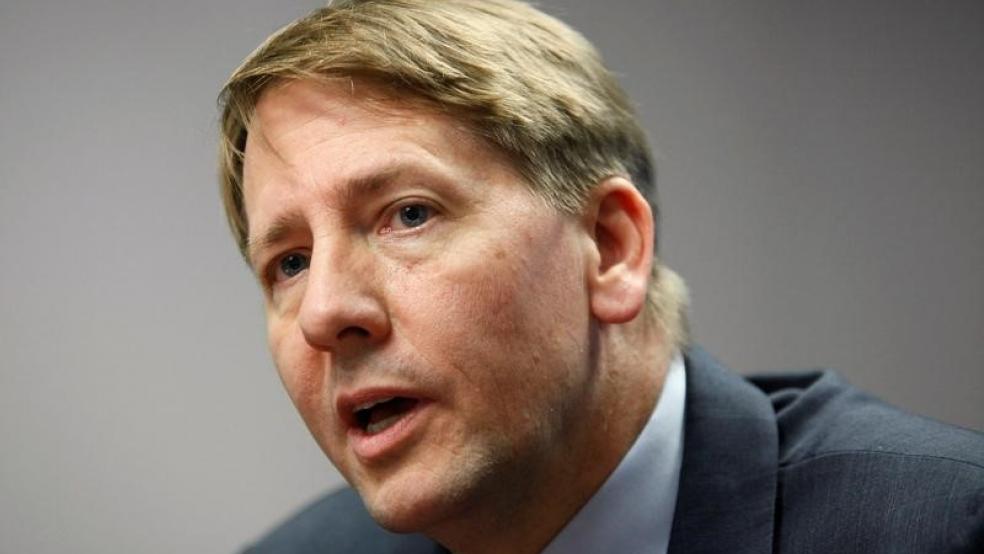WASHINGTON (Reuters) - Whether or not Richard Cordray stays as head of the Consumer Financial Protection Bureau (CFPB) until his term ends in July, the agency’s ability to rein in Wall Street will be severely weakened, political insiders, lawyers and consumer advocates said.
Doubts are growing that the Democratic director of America's top consumer watchdog will leave his post to run for Ohio governor, as had been widely speculated, after a lackluster Labor Day speech sparked anxiety over his campaign appeal, according to some party insiders.Cordray, whose term at the CFPB ends in July 2018, is not expected to announce any decision to run until the regulator releases long-awaited rules restricting payday lenders, which are expected within weeks, according to multiple sources.Cordray has evaded questions from the Republican chairman on the House of Representatives Financial Services committee, Jeb Hensarling, about his plans, writing in a recent letter: "At this time, I have no further insights to provide on that subject."Even if Cordray stays, he will not enjoy a reprieve from Republican efforts to defang the agency which they believe is too powerful and restricts the flow of credit."He has been under constant attack in his position because of the threat he poses to the status quo on Wall Street," said Karl Frisch, executive director of Allied Progress, a consumer advocacy group which has called for Cordray to stay on."I would imagine that would continue regardless of how long he stays in the job."Some Republicans, including Hensarling, have introduced legislation to weaken and even dismantle the agency which was created as part of the post-crisis Dodd Frank Act.While those bills have not gotten far, Cordray will still have to play defense against a Republican-dominated Congress poised to suffocate new CFPB rules using the Congressional Review Act, a mechanism already used to kill 14 Obama-era regulations.Lawmakers are also considering amending the government budget to bring the CFPB's funding, currently provided by the independent Federal Reserve, under the control of Congress, potentially allowing Republicans to starve the agency of resources.President Donald Trump could also take the more extreme step of intervening to remove Cordray. A court ruling last year said the president should be able to fire the CFPB director without cause, which the CFPB is appealing. Even if the CFPB is victorious, Trump may still seek to use causes allowed by the law, such as inefficiency or neglect of duty, to get Cordray out of the way, according to legal experts.The CFPB has declined to comment multiple times on Cordray's plans, possible successors or how it would operate in his absence.MNUCHIN REPLACEMENTSince Trump came to power, the CFPB has raced to finish outstanding rule proposals and taken numerous enforcement actions, hoping to lock in its work in case Trump appoints a pro-Wall Street replacement, said Quyen Truong, a partner at law firm Stroock & Stroock & Lavan, who was the assistant director and deputy general counsel for the CFPB until early 2016.If Cordray quits or is removed, Dodd-Frank requires his deputy to step up temporarily but lawyers say the legitimacy of that step could be challenged. The act may be superseded by a law that allows the president to temporarily fill vacancies. Alan Kaplinsky, head of the Consumer Financial Services Group at law firm Ballard Spahr and a Cordray critic, said the White House is widely expected to appoint Treasury Secretary Steve Mnuchin as an interim replacement, who would then delegate his duties to lower-ranking officials.Scrapping a new rule allowing bank and credit-card customers to band together in class-action lawsuits and tougher regulation of payday lenders will likely be a Trump appointee's first moves, Kaplinsky said.This could be done by delaying the rule's effective date for further study, a common Washington tactic used to stall the implementation of regulation indefinitely.An acting director could also dramatically scale back the consumer complaint database, a key tool the CFPB uses to resolve disputes for individuals and to identify corporate malfeasance, Truong said.Meanwhile, she said, the agency will continue pursuing enforcement cases, but those will likely be much smaller in scope.Jeff Emerson, a spokesperson for Hensarling, said any new director would naturally be bound by the law, but this person would have "a lot of discretion" to make changes. (Reporting by Lisa Lambert; Editing by Michelle Price and Cynthia Osterman)With or without Democratic director, U.S. consumer watchdog to be weakened

Jonathan Ernst



